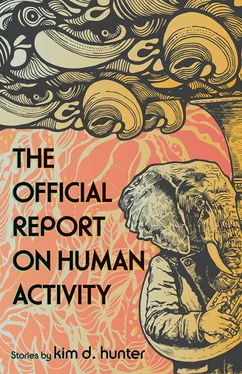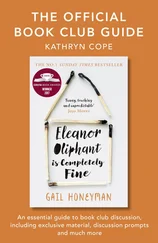“She split.”
“What?”
“She and your pal the Egyptologist, who, as it turns out, is her uncle, they just split, went off. I don’t know where. You could call the Art Institute and ask them where Egyptologists go when they go.”
Days before the news conference, the teacher went to the library with more than a suspicion that no one had really read the Girl’s essay. There wasn’t even a hint of news about the message on the elephant’s hide. That gave her some hope for success.
Once contacted by the Librarian’s boss, the Girl’s father had kept her out of school and given in to the plans to put the Girl on camera, despite pleas from the teacher who tried to dissuade him from both actions. She thought putting children in front of cameras was an especially bad idea. Among other things, she insisted children need privacy. But most of her ideas about how to treat children were ignored, even in the school where she worked. She thought perhaps if she could contact the Librarian, she might be able to persuade her to persuade her boss to read the essay himself, to take the glory and accomplish his goal to boot, though she feared the elephant might not make the trip from the hospital to the library.
When she finally arrived at the help desk, the teacher almost didn’t recognize the Librarian as the person from the online video of the news conference. Her bright copper skin was nearly ashen. The eyes that had darted around at the news conference were still and aimed low.
“Hello there.”
“Can I help you?”
“Actually, I am not in search of a book.”
“Then this is strange place to be, isn’t it?”
“The little Girl who wrote about the elephant being moved, I’m her teacher.”
“You and everyone else in driving distance.”
“I was hoping to persuade the gentleman I saw on TV not to… she’s very young to be in front of so many people.”
“But you would be the perfect messenger, right?”
“Actually, no, I think the gentleman—”
“That’s no gentleman, that’s my boss.”
“—would be the best person to—”
“You got something against humor?”
With that the Librarian turned to face another patron walking toward the help desk. The teacher felt desperate. “Have you actually read the essay?”
The Librarian turned away from the patron and back to the teacher. Many had come claiming to be the Girl’s teacher, mother, former dentist, or cousin who just happened to be in town for the taxidermists’ convention. But none had asked that question.
Before the Girl’s teacher came to the library, the Librarian’s boss and the Girl’s father had come to an agreement. As a result, the Girl had been spending more and more time with the Librarian in preparation for the news conference where the Girl would read her essay about why the elephant should be moved to the library. The Librarian was very nice, but the Girl couldn’t help but wish the storyteller was there to help instead of the Librarian.
“She ran away?” the Girl asked.
“Sort of.”
“Does her mother know?”
“Her mother’s dead.”
“Does her father know?”
“He’s dead too.”
“I know how she feels. How did her mother die?”
“It’s a long story.”
“I would love a long story like the storyteller used to tell.”
The Librarian would have also loved a long story and she wanted to speak with the “storyteller” as well. She had come to see the media consultant in a new light. She could imagine them having coffee and conversation about feeling forced to change the ways they had earned their living. The Girl wanted to talk with the storyteller about how she had felt when her mother died.
She had been thinking about her mother more often. She drifted off while she and the Librarian were practicing answering questions about why the elephant should be moved or if he should be moved. Sometimes, she would hear a voice telling her the storyteller’s stories. Sometimes it was the voice of the storyteller, but more and more often it was her mother’s voice. Then her mother would stop telling the story and begin talking about what a wonderful time they had all had in the kitchen on Saturdays listening to the opera, smelling the food her father prepared, and dancing. Sometimes, the Girl would smile for what seemed like no reason to the Librarian. Sometimes, she would be on the verge of tears. The only thing the Librarian knew for sure was that on those occasions of joy, distance, and sorrow, the Girl had left the room the way readers leave a place for the book they are reading. The Librarian thought this was a bit curious because she had noticed the Girl actually had trouble reading, so much trouble that she had begun harboring doubts that the Girl had written the essay.
Strangely, her boss had not let the Librarian see the essay. She had taken his word that it supported the idea of the elephant being moved to the library. The Girl confirmed that much. But there was something unsettled about the Girl and the elephant or something unsettled in the Librarian’s mind.
The elephant’s guards had become very weary of reporters. They were pursued and interviewed on the job, in the parking lot, at the bus stop and at their homes. They were profiled to within inches of their very existence. At first, they consented because it was a chance to talk about the elephant. But their talk didn’t help revive the elephant. It seems the drama of the elephant’s prolonged agony made a better story than any potential recovery. They began quitting in small groups and reconvening at a bar several blocks north of the hospital where they didn’t think most reporters would tread because reporters didn’t know the place existed and, they thought, it was not the sort of place reporters were used to frequenting.
The place was called the Deep Seven. The regulars were unsure who owned it. Some thought it might be the cook, a white looking blond woman with a thick, phony German accent. Others assumed it was the bartender, who seemed like a darker version of the woman and said he was born around the corner though no one from the neighborhood ever recalled seeing him or his family in the area during the time he claimed to have been raised there.
It was a place with a lot of things that didn’t exist in many other places anymore: payphones with rotary dials, ashtrays, bathroom stalls with small round windows, transoms, and a jukebox with vinyl records. That juke box was the attraction for some of the more adventurous students from the university several blocks away and for the reporter whose grandmother had inspired him to visit the Egyptologist.
Friends of the reporter had told him about a strange dive of a bar with Ellington and Brahms on the juke box. When he finally got around to visiting, he discovered Mingus, T-Bone Walker, and Copeland on the box as well. He put many coins in the machine and began playing Monk and Satie tunes back to back. The combination of music struck the bartender, who offered the reporter a free drink. This was noted positively by those who thought the bartender was also the owner.
“We’re always glad to get students in here. We need fresh faces and blood, livens up the place, breaks the monotony.”
“Actually I’m a reporter.”
The bartender laughed. “My folks have had enough of the media for a while. This is one place they could escape. Reporters even followed some of them home. But they don’t show up here for some reason. We began to think of this as an embassy.”
“Who’s being protected from what?”
The bartender took a moment to breathe deeply. On the one hand, the young reporter seemed like a trustworthy, square business sort. On the other hand, how could he not have recognized the patrons?
Читать дальше












